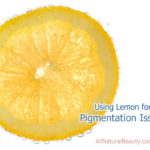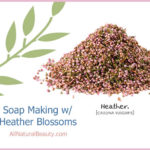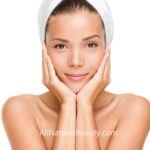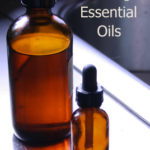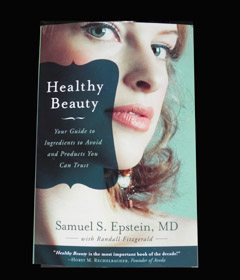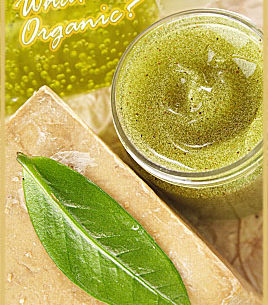
Environmental issues are a passion of mine. I love learning and teaching others about a wide range of ecological topics, such as organic standards, and natural and organic products (including natural skin care and green housecleaning supplies!). It can be really confusing buying truly natural and safe products, since many natural brands may still contain some irritating and potentially toxic ingredients (though they tend to have way less than commercial brands).
So for this month’s article I decided to define what natural is!
What is natural?
Currently, there is no governmental definition of the word ‘natural’. People define the word ‘natural’ differently: natural means different things to different people. In other words what some people accept as natural, others may not (it depends on how strict a person’s definition of natural is). I think that a good overall broad definition of natural is something that is grown or found in nature, or made from ingredients found in nature that aren’t excessively altered from their natural state (though they may undergo some kind of processing). Usually people accept that things that live, are grown, or found in the natural world are ‘natural’, like fruits, vegetables, herbs and other plants, and animals. Most people also consider products made from or extracted from wildlife (plants and animals) as ‘natural’ too, such as oils, milk, honey, vinegar, herbal extracts (usually made from grain/grape alcohol and herbs), yogurt, beeswax, and essential oils.
The confusion starts when using ‘naturally derived’ ingredients. These ingredients begin with a natural substance but then many are altered or processed so much that the end ingredients do not resemble what is originally found in nature. Many people consider these ‘naturally derived’ ingredients to be ‘natural’ since it started out as and was made from a natural ingredient. A few people consider them totally synthetic. Some people think they are synthetic but acknowledge the natural origins. And then there are others that consider them somewhere in between synthetic and natural. Personally I think that most (but not all, it depends on the ingredient) naturally derived ingredients fall into the latter three categories (I think a few naturally derived ingredients are somewhere between synthetic and natural, but I define most naturally derived ingredients as synthetic but that one or more of its ingredients was natural before processing/making it. Some are completely synthetic though). But my definition of natural tends to be stricter than most people’s.
Furthermore, adding to the confusion, some ‘naturally derived ingredients’ were originally made from some natural ingredients in the past but are now completely synthesized in the lab. However, some companies still claim they are made from natural ingredients, even though they are not. In addition, there are natural chemical components (substances that exist in plants, animals, and the natural world) but the commercial form is usually lab made. There are also many natural substances that are separated from the whole ingredient and then they are concentrated in the lab. Lastly, some completely natural ingredients are also adulterated with synthetics.
Examples of debated naturally derived ingredients often found in natural products are naturally derived detergents, vegetable emulsifying wax, and iron oxides. Detergents are synthetic substances (though some but not all are derived from natural ingredients, they are so processed and altered, detergents are not the same as the original substance. Some are gentle and some are irritating and drying). I consider vegetable emulsifying wax to be synthetic though many natural companies call it natural. Some types of vegetable emulsifying wax start with some ingredients that are natural or found in nature (while some types of emulsifying wax are petroleum based), but then they are processed with detergents or polysorbates, so in my mind they aren’t very natural at all (though many are pretty benign). I define iron oxides as somewhere between natural and synthetic but closer to natural. Iron oxides exist in nature but they often contain toxins. So iron salts (mined from the earth and completely natural) are converted to iron oxides in the lab. Personally I use all three ingredients in natural brands, but only formulate with iron oxides (since I try to craft all natural or as close to it as possible).
Since there are no governmental standards of what constitutes a ‘natural’ product, a company can literally make a mostly synthetic product, add just 1 or 2 drops of a natural substance, and then slap the word natural on their label. Many commercial brands have started to produce ‘natural’ versions of their products, and they often contain many more synthetics compared to products produced from smaller or naturally inclined companies, which tend to be mostly natural or all natural (though there are many ‘natural’ companies that are full of synthetics too!). Some of these synthetics are benign but many are irritating or potentially toxic. However, just because something is natural does not mean it is safe and non-toxic—plenty of people are allergic to certain natural ingredients, and if an ingredient is used incorrectly or in the incorrect proportions they can become toxic or cause sensitivity, and some natural ingredients like talc I wouldn’t recommend using at all–and just because something is synthetic does not make it toxic or irritating. But in my opinion, overall many natural ingredients (if used correctly) are safer than many synthetics used in products, and (though everything has an impact) are usually more eco-friendly Many synthetics in products are also fillers, texturizers, and fragrances, so don’t have a function other than to cut costs and make the product look, smell, and feel good.



